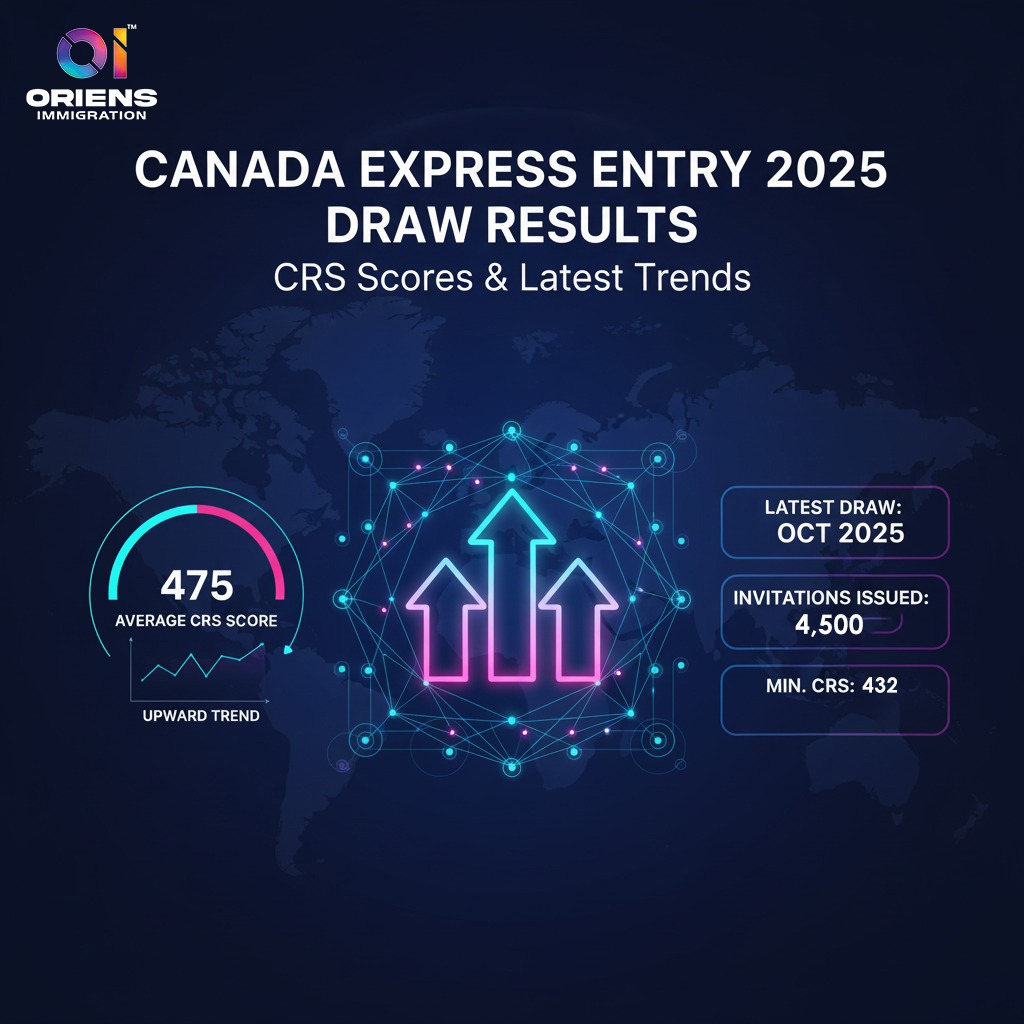













Canada’s Express Entry system continues to be the fastest pathway for skilled immigrants to obtain permanent residency (PR). With regular Express Entry draws, candidates across the world get an opportunity to move to Canada based on the Comprehensive Ranking System (CRS) scores. Staying updated with the latest draw results is crucial for applicants who want to understand trends, improve their eligibility, and increase their chances of receiving an Invitation to Apply (ITA).
In this blog, we offer a comprehensive overview of Canada Express Entry draw results, CRS scores, and trends, helping prospective immigrants make informed decisions.
The Express Entry system is a points-based immigration selection process that manages applications for Federal Skilled Worker (FSW), Federal Skilled Trades (FSTP), and Canadian Experience Class (CEC) programs.
– Draws are conducted regularly by Immigration, Refugees and Citizenship Canada (IRCC).
– Applicants are ranked using a CRS score, which considers age, education, work experience, language proficiency, and additional factors.
– Candidates with the highest CRS scores are invited to apply for PR.
Each draw can vary in terms of:
– Number of ITAs issued
– Minimum CRS cut-off score
– Targeted programs (e.g., FSWP, CEC, or provincial nominees)
Recent draws have highlighted some important trends for skilled workers aiming for Canada PR:
1. Draw Frequency: IRCC continues to conduct draws almost every two weeks.
2. CRS Score Trends: The CRS cut-off scores usually range between 470 and 510, with slight variations depending on the category.
3. Targeted Draws: Some draws focus exclusively on candidates with a Provincial Nomination, giving a 600-point boost to their CRS scores.
4. ITA Numbers: ITAs issued per draw can vary significantly, typically ranging from 2,500 to 5,000 invitations, depending on Canada’s immigration targets.
These trends reflect Canada’s commitment to skilled immigration while balancing economic needs and population growth.
Understanding the CRS score calculation is vital to improving your chances of receiving an ITA. The main factors include:
1. Age: Candidates between 20 and 29 years receive maximum points.
2. Education: Higher degrees, such as a master’s or PhD, boost CRS points.
3. Work Experience: Skilled work experience, especially in Canada, adds significant points.
4. Language Proficiency: IELTS, CELPIP, or TEF scores in English or French directly influence CRS.
5. Additional Factors:
– Provincial nominations (+600 points)
– Job offers in Canada
– Sibling in Canada
By focusing on these factors, applicants can improve their CRS scores for the next Express Entry draw.
Learn more Express Entry for Indians: What You Need to Know
Recent draw analysis indicates the following key trends:
1. Targeted Draws Are Increasing: IRCC often conducts draws specifically for CEC or FSTP candidates to address labor shortages in certain provinces.
2. CRS Scores Are Slightly Decreasing: Although cut-off scores were previously above 470, recent draws show a slight decrease, which increases opportunities for mid-range candidates.
3. Provincial Nominee Program (PNP) Dominance: Candidates with provincial nominations have a significant advantage due to the 600-point CRS boost.4. Comprehensive Approach: IRCC now considers all factors, including Canadian work experience, education, and language skills, making it critical for candidates to optimize their profiles.
Understanding these trends allows applicants to make informed decisions, such as enhancing their language test scores or securing provincial nominations.
CRS scores dictate eligibility for Canada’s fastest skilled immigration streams. Higher scores maximize an applicant’s chance of receiving an Invitation to Apply (ITA) for permanent residence. Understanding CRS factors helps targeted improvements:
1. Language Proficiency: Strength in English/French language exams (IELTS, CELPIP, TEF) directly boosts CRS.
2. Education: Canadian post-secondary degrees or equivalent foreign credentials verified by Educational Credential Assessment (ECA).
3. Work Experience: Skilled work experience, especially combined with Canadian experience, is highly weighted.
4. Additional Factors: Provincial nominations, valid job offers, and sibling connections in Canada raise CRS scores significantly.
The Canada Express Entry system is dynamic and highly competitive. Staying informed about draw results, CRS scores, and immigration trends is essential for success. By optimizing your profile, understanding eligibility, and considering provincial nomination streams, you can significantly enhance your chances of receiving an ITA and securing permanent residency in Canada.
Monitoring Express Entry draws and adapting your strategy accordingly ensures that you are always ready for opportunities and can make well-informed decisions for your immigration journey.
1: What is the CRS score in Canada Express Entry?
CRS, or Comprehensive Ranking System, is a points-based tool that ranks candidates based on factors such as age, education, work experience, and language proficiency, prioritizing them for invitations to apply for permanent residence.
2. What is the minimum CRS score required for Canada Express Entry?
CRS scores vary per draw, usually ranging from 470 to 510 points, depending on the program and target number of ITAs.
3. How often are Express Entry draws conducted?
Typically, IRCC conducts draws every two weeks, but this can vary depending on immigration targets.
4. Can I improve my CRS score before the next draw?
Yes, candidates can update their profiles with improved language scores, additional education, new work experience, or spouse details to increase CRS points, as long as updates are made before an ITA is issued.
5. What are targeted draws in Express Entry?
Targeted draws invite candidates from specific programs like CEC or FSTP, or those with a provincial nomination, allowing IRCC to meet labor market needs.
6. How do provincial nominations impact CRS scores?
Provincial nominations give a 600-point boost, significantly increasing your chances of receiving an ITA.
7: Are there special CRS considerations for French-speaking applicants?
Yes, candidates who possess strong French language skills receive additional CRS points under the bilingualism factor, which enhances their chances in draws that favor French speakers.


Oriens is your one-stop solution for resolving all immigration-related queries and getting assistance with the procedure. Our consultants work towards ensuring that your journey of settling abroad does not involve any sort of hustle-bustle. Providing a host of solutions, we aim to take responsibility for all errands and requirements of your visa application process.
© 2025 All rights reserved